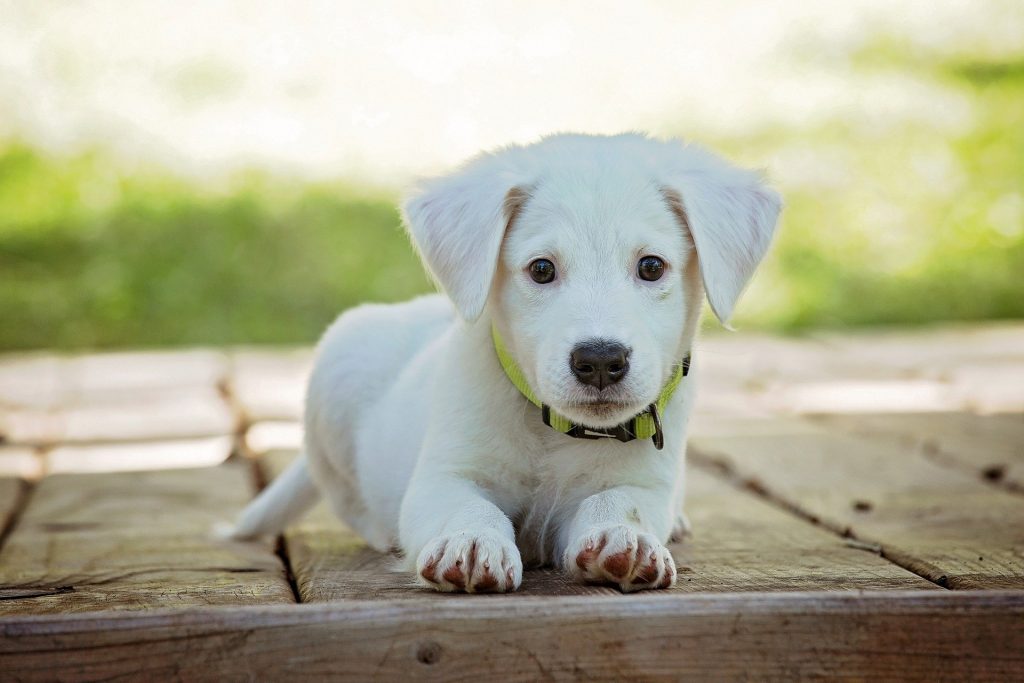Puppy Care
Critical periods in puppy development

The puppy responds only to warmth, touch, and smell. He cannot regulate body functions such as temperature and elimination.
Eyes and ears are open, but sight and hearing are limited. Tail wagging begins and the puppy begins to control body functions.
Sight and hearing functions well. The puppy is learning that he is a dog and has a great deal of need for a stable environment.
Interacting with his mother and littermates, the pup learns various canine behaviours. He is now aware of the differences between canine and human societies.
The pup has the brain wave of and adult dog. The best time for going to a new home. He now has the ability to learn respect, simple behavioural responses: sit, stay & come. Housebreaking begins. He now learns by association. The permanent man/dog bonding begins, and he is able to accept gentle discipline and establish confidence.
Try to avoid frightening the puppy during this time, since traumatic experiences can have an effect during this period. As you can see, this period overlaps that of the previous definition and children or animal should not be allowed to hurt or scare the puppy — either maliciously or inadvertently. It is very important now to introduce other humans, but he must be closely supervised to minimize adverse conditioning. Learning at this age is permanent. This is the stage where you wonder if your dog is going to be a woosy butt all his life. Also introducing your puppy to other dogs at this time will help him become
more socialized. The primary age to attend a puppy play school at your veterinary
clinic
This critical period is also known as the “Age of Cutting” – cutting teeth and cutting apron strings. At this age, the puppy begins testing dominance and leadership. Biting behavior is absolutely discouraged from thirteen weeks on. Praise for the correct behavior response is the most effective tool. Meaningful praise is highly important to shape positive attitude
During this period puppies test their wings- they will turn a deaf ear when called. This period lasts from a few days to several weeks. It is critical to praise the positive and minimize the negative behaviour during this time. However, you must learn how to achieve the correct response. This period corresponds to teething periods, and behavioural problems become compounded by physiological development chewing.
Also called, “The fear of situations period”, usually corresponds to growths spurts. This critical age may depend on the size of the dog. Small dogs tend to experience these periods earlier than large dogs. Great care must be taken not to reinforce negative behaviour. Force can frighten the dog, and soothing tones serve to encourage his fear. His fear should be handled with patience and kindness, and training during this period puts the dog in a position of success, while allowing him to work things out while building self-confidence.
Many breeds’ especially giant breeds continue to grow and physically change well beyond four years of age. The average dog develops to full maturity between 1-1 1/2 years and three years of age. This period is often marked by an increase in aggression and by a renewed testing for leadership. During this time, while testing for leadership, the dog should be handled firmly. Regular training throughout this testing period, praise him for the proper response. Giving him no inroads to affirm his leadership will remind him that this issue has already been settled

PUPPY INFORMATION SHEET
The addition of a new puppy is an exciting time for the family however the puppy may be feeling a little overwhelmed at first. Remember to be patient, happy and positive at all times with your puppy. Ensure the puppy can access a quiet area it can retreat to when it feels tired, scared or overwhelmed. Puppies grow into adult dogs with lifespans between 8yrs (giant breeds) and up to 20+ years(small toy breeds) which is a huge responsibility with many happy returns. Giving puppy the appropriate requirements from the beginning reduces the risk of potential undesirable behaviours and health concerns in the future. There are many different breeds of dogs available in Australia all with their own characteristics, it is advised to research the natural behaviour of your dog to understand its daily requirements.
Many puppies enter their new homes around the age of 8 weeks which means they are eating solids now and have no nutritional requirement for milk. A puppy should be fed a premium quality complete and balanced diet which contains ingredients that provide the appropriate levels of vitamins and minerals to support and sustain healthy growth. For small to medium sized breeds a puppy diet should be fed until 12 months, for large to giant breeds 18 months of a large breed puppy formula. Puppies come in many sizes having different nutritional requirements to ensure healthy growth. Puppies should be fed 3-4 meals a day until 3 months old then 3 meals to 6 months and 2 meals for the duration of life. Always follow the feeding guidelines of the chosen food and allow for treats when calculating daily feeding amounts. A larger portion of a premium food should be fed in the morning to provide the necessary energy required for the day. It is important the puppy gains weight and
growth steadily and too rapidly as this can cause joint issues. Speak to the veterinary staff
for further dietary information.
Once puppy has settled into its new environment they will become very comfortable and begin exploring different sounds, smells, textures and situations. It is essential during this learning period they experience pleasant situations. Between the ages of 3 – 12 weeks puppies should have as many pleasant experiences with as many situations, sounds, people and more. Puppies should have access to various toys to stimulate both physically and mentally. Training should begin as soon as you bring puppy home, use the puppies name and a single word cue e.g. sit, stay, drop, come. Always reward positive behavior and stay patient. The puppy is looking to you to show it what you mean, this is all new after all, use your body posture (stand tall when instructing, crouch low when inviting) and tone of your voice (clear happy voice)
when introducing puppy to new situations. Puppy preschools provide a safe environment to
provide early socialisation and training continued with local obedience / training clubs
Puppies need to learn how to use the toilet, it is important not to discipline your puppy for toileting accidents. Up until the age of approximately 16 – 18 weeks they don’t realize they need to go until they are actually going. Useful tips to be successful with toilet training is to notice what the breeder was using for toileting e.g. grass, dirt, concrete, newspaper and begin with that. Know the cues – 1. Excitement 2. Waking up 3. Before bed 4. After eating or drinking 5. After a scare or startled moment. Make toilet time boring,same spot on lead and no talking other than a cue e.g. Fluffy, go wee’s. When an accident occurs remove puppy from the room and clean the spot with an odour neutralising cleaner (ensure it does not contain ammonia). Praise puppy when they go on cue or in a desired spot.
Puppies have maternal protection for up to 6 weeks of age passed from their vaccinated mother, between 6 – 8 weeks of age puppies should commence their initial course of vaccinations. Your breeder should have had the first vaccination and supplied you with a vaccination certificate / record identifying the next due date. The course of vaccinations vary between clinics, speak with your veterinarian regarding their protocol, generally initial dose is between 6 – 8 weeks with a booster required 4wks later between 10 – 12 weeks old (a third dose at 14wks may be required if instructed by the vet) then annual boosters for the duration of life. After the final puppy booster allow 10 – 14 days before taking puppy out publicly to ensure adequate immunity. Vaccinations provide protection against Parvovirus, Distemper and Hepatitis, referred to as a C3 or core vaccine with the addition of the Kennel cough components it is referred to as a C5 vaccine. Many of these diseases are extremely resilient and contagious but have been managed through increased awareness and compliance with vaccinations
Worming: Many puppies are born with intestinal worms, hookworm and roundworm. Deworming should commence from 2 weeks and continue every 2 weeks until 12 weeks of age, between 3 – 6 months de-worming should be monthly, from 6 months for the duration of life the puppy should be de-wormed every 3 months (unless an infestation occurs). Options available include puppy suspensions such as Canex Puppy Suspension or tablets such as Drontal for Puppies and Small Dogs. It is important to know the weight of your puppy when purchasing a wormer as dose is weight based, if you do not know the weight bring your puppy in with you (we love puppy weigh in cuddles….I mean visits). There are 4 main types of intestinal worms that may affect your puppy throughout its life including hook and roundworms as mentioned previously with the addition of tapeworm and whipworm. Speak with the friendly veterinary staff for any further worming information and products available.
Heartworm: As the name suggests this worm affects the heart and is transmitted by mosquitoes. Puppies should commence heartworm prevention between 3 – 4 months old, options include monthly chews or topical treatments. An injection at 6 months once they reach adult weight with a booster at 15 months and annual boosters with vaccinations for life is also available. If a heartworm preventative is not commenced by 6 months a quick, non-invasive blood test is required prior to administering any heartworm prevention. Fleas: External parasites which are present all year round but ‘flea season’ is in the warmer months between September and late February. Flea prevention is important all year round and includes the surrounding environment as well as the puppy. Treatments can commence between 8 – 12 weeks depending on the product. Many products are available including monthly chews, tablets or 3 monthly topical treatments. Always read the product information and usage guidelines prior to administering flea treatments. Keep the environment clean and wash bedding and toys regularly to reduce the risk of infestation. Some dogs can develop a flea allergy dermatitis as a result from a single flea bite, maintaining preventative treatment and a clean environment will significantly reduce the risk.Desexing: As of July 1st 2018 any dog that is born that is not a registered breeder is required to be desexed by the age of 6 months. Desexing reduces the risks of health problems for both male and female dogs including pyometra (infected uterus), mammary tumours (breast cancer), prostate and testicular cancers and urinary tract disease, all of which can potentially become fatal. Desexing also reduces unwanted behaviours such as wandering, leg humping and aggression. Only a qualified surgeon can perform a spay or castrate procedure which is only a day procedure with a 2 week recovery period, speak with the veterinary team if you have any further questions.
Microchipping: A microchip is the size of a grain of rice implanted just under the skin by a simple injection which can identify your pet for a lifetime! The microchip has a unique number allocated to it and registered at a database. When the dog is scanned with a specialised scanner the unique number is displayed and can then be confirmed with relevant records. Microchips have reunited many lost pets with their distressed families since their introduction. It is essential to keep your details accurate and up to date with the microchip database your pet is registered with. Microchip registration does not replace annual council registrations. From July 1st 2018 microchipping is mandatory for all dogs. Council registrations usually begin from 3 months of age with annual renewals. Discounts apply for desexing, microchipping and additional approved training. Check with your local council for details and pricing.Like us dogs get 2 sets of teeth, deciduous (baby) teeth begin to fall out between 3 – 6 months old with the adult erupting and lasting a lifetime. During the teething phase of 3 – 6 months puppy will chew on just about everything as their teeth and gums ache, provide plenty of teething friendly toys and chews. On occasion you may be lucky enough to find a puppy tooth lodged in the toy! It is common for the gums to bleed a little when a tooth is lost. Dental care can begin with a premium quality dry food and maintained throughout life with annual dental checks, a good quality diet, plenty of dental friendly chews and toys and weekly brushing of the teeth. Good dental hygiene provides not only mouth health but complete digestive health as dental disease is associated with many other health concerns affecting the digestive tract. The friendly reception staff would be happy to discuss dental products available.
Pets can become injured or ill which can put financial pressure on families at an already stressful time, pet health insurance can relieve the burden of an unexpected vet bill. Pet plan pet insurance offers a wide range of policies to accommodate each budget and family needs, speak to our friendly trained pet plan representatives for more information. Many companies offer pet insurance, be sure to find a policy suitable to you and pets requirements.
Many house hold items including plants and human foods can be toxic to dogs e.g. toothpaste, snail and rat baits, human medication, grapes, avocado and tomatoes are just a few which can be fatal. Councils can apply large fines if your dog is found roaming outside your yard, ensure you have a secure yard and sturdy fences. Dogs respond to good positive situations and learn much quicker with positive reinforcement and repetition. Socialization is essential during 3 – 16 weeks but must be continued through life. Involve the whole family with the puppy from the start. Teach the puppy and children of all ages how to respect each other.
A new puppy….here’s a summary of the routine responsibilities FEEDING: complete & balanced puppy diet for 12 -18mths as per feeding guide
VACCINATIONS: as instructed by vet. INTESTINAL WORMING: according to age – 2-12wks = fortnightly, 3-6mths = monthly and quarterly (every 3 months) there after
HEARTWORM: begin by 6 months, as advised by your vet FLEAS: as recommended by the manufacturer DESEXING: by 6 months, older for larger breeds (mandatory from July 1st 2018 for pet owners)
MICROCHIPPING: no later than the time of desexing (mandatory from July 1st 2018)
COUNCIL REGISTRATION: annually
DENTAL CARE: premium quality diet and dental friendly toys
PET INSURANCE: optional, shop around to compare policies
COMPANIONSHIP: be as loyal and dedicated to your puppy as they will be to you for the rest of their life
ENJOY EVERY PRECIOUS MOMENT
Please contact Adelaide Plains Vet Clinic if you require any additional information
Successful Canine Parenting
Some simple rules to follow to be a successful canine parent
Understand a dog’s perspective – be fair
Remember dogs are amoral, opportunist, self-centred, constantly learning and explore the world with their
mouths. To be anthropomorphic (uniquely human characteristics to non-human beings), dogs make the
most of current opportunities because life is short and time is fleeting.
Be a good teacher
Set your dog up to succeed. Control what your dog learns. Guide them to making the right decisions. Teach
the correct behaviour, don’t waste time teaching what NOT to do.
Communicate clearly
Your job is to communicate to your dog when they are performing a correct behaviour. Catch them doing
appropriate behaviours and reward it!!! A frequent occurrence of positive reinforcement will help your dog
learn quickly.
Be consistent
Set the rules of the household and make your interactions predictable and consistent. Inconsistency and
unpredictability cause fear and anxiety leading to behavioural problems.
Be your dog’s advocate
Be aware of your dog’s body language and protect him from overwhelming situations. Your dog cannot
speak for himself. A well-meaning group of children running over and surrounding your puppy can be
extremely frightening to your puppy. You must be prepared to intervene and prevent negative
experiences.
Canine Characteristics
- Dog’s are amoral. They do not know right from wrong, they know safe and unsafe. It is safe to raid
the garbage bin when people are absent, it is unsafe when people are present. - Dog’s are opportunist and self-centered. It is all about them
- Dog’s are social making them great companions
- Dogs are constantly learning from their actions. Learned behaviours can be appropriate or
inappropriate for human counterparts. Evaluate your dog’s behaviour from a learning perspective,
what did they get from that behaviour? - Dog’s lack thumbs, they explore the world with their mouths, therefore everything is a potential
chew toy. - Dogs natural behaviours vary depending on specific breed traits. Hounds track, Terriers hunt,
Working dogs assist humans in guarding, pulling etc., Herding dogs herd in various styles, Sporting
dogs assist in various outdoor activities including hunting, fishing etc., Toy Breed dogs are small and
generally companion pets, Non-sporting dogs developed for purposes other than sport.
Know your dogs natural behaviours and traits.

